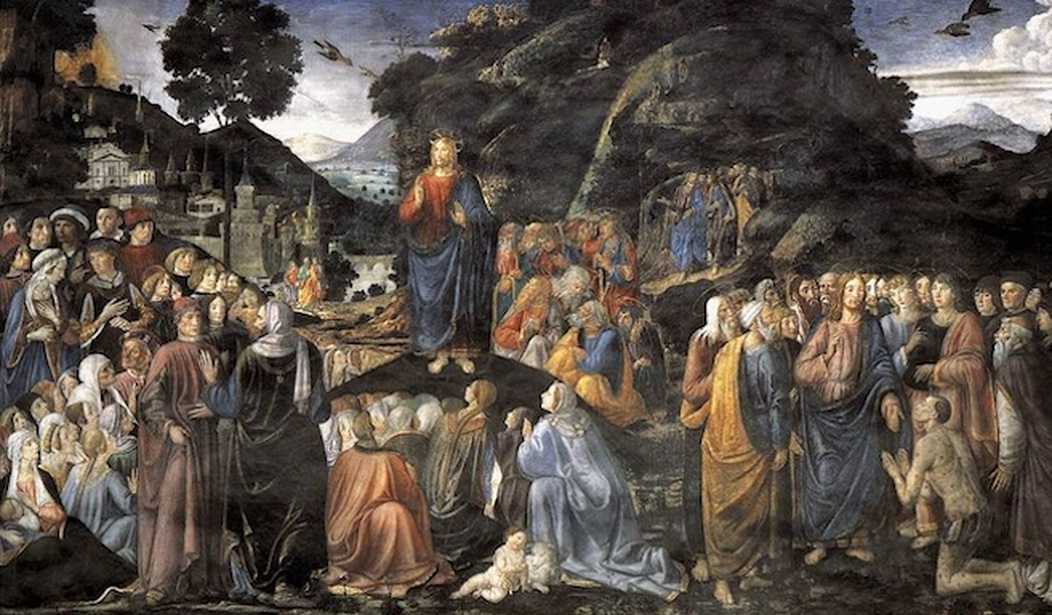This morning’s Gospel reading is Matthew 5:38–48:
Jesus said to his disciples:
“You have heard that it was said, An eye for an eye and a tooth for a tooth. But I say to you, offer no resistance to one who is evil. When someone strikes you on your right cheek, turn the other one as well. If anyone wants to go to law with you over your tunic, hand over your cloak as well. Should anyone press you into service for one mile, go for two miles. Give to the one who asks of you, and do not turn your back on one who wants to borrow.
“You have heard that it was said, You shall love your neighbor and hate your enemy. But I say to you, love your enemies and pray for those who persecute you, that you may be children of your heavenly Father, for he makes his sun rise on the bad and the good, and causes rain to fall on the just and the unjust. For if you love those who love you, what recompense will you have? Do not the tax collectors do the same? And if you greet your brothers only, what is unusual about that? Do not the pagans do the same? So be perfect, just as your heavenly Father is perfect.”
“The Lord is kind and merciful,” Psalm 103 teaches us in today’s Mass. And indeed He is in this Gospel passage from the Beatitudes. This teaching gives us great comfort about our own eventual encounter with the Lord at our judgment, a consistent theme throughout the entirety of the Scriptures.
That revelation imposes a set of ethics on us — at the very least. Jesus speaks of this in his parable of the unforgiving servant later in Matthew (18:21-35). If we will receive this kindness and mercy from the Lord, should we not pass that along to others? In the parable, the king forgave a debt far beyond anything his servant could repay, only to see the same servant prosecute a petty debt without mercy against a colleague.
The lesson in that parable was basically the Golden Rule, the root of ethics: Do unto others what you would have done unto you. If you expect mercy, you must give it. If you want forgiveness, you have to be willing to forgive as well. It establishes an expectation of reciprocity as well as justice.
In today’s readings, though, Jesus goes beyond ethics. Indeed, He goes beyond justice by any human measure. Jesus does not limit kindness and mercy in a transactional sense, but instead puts it into a transcendent sense.
In Jesus’ teaching, neither justice nor reciprocity enter into the equation. Loving one’s neighbor as one’s self has a clearly reciprocal basis, but there is no expectation in reciprocity in loving one’s enemy. Neither is there justice in the human sense to turning your cheek after being assaulted, or being “pressed into service,” a polite description of temporary slavery. Jesus asks His followers to bear all of this not for their own sake, but for His and the Father’s.
But why? Why would this serve the Father’s will, and why would we allow it? Paul offers us an explanation in his first letter to the Corinthians, our second reading today:
Do you not know that you are the temple of God, and that the Spirit of God dwells in you? If anyone destroys God’s temple, God will destroy that person; for the temple of God, which you are, is holy.
Let no one deceive himself. If any one among you considers himself wise in this age, let him become a fool, so as to become wise. For the wisdom of this world is foolishness in the eyes of God, for it is written: God catches the wise in their own ruses, and again: The Lord knows the thoughts of the wise, that they are vain.
So let no one boast about human beings, for everything belongs to you, Paul or Apollos or Cephas, or the world or life or death, or the present or the future: all belong to you, and you to Christ, and Christ to God.
To truly become children of God, we must allow the Holy Spirit to use our hearts as His temple. And what are our “hearts”? This is not an anatomical reference, but a philosophical and theological construct. Our “heart” is the combination of our will and our intellect. It is the inflection point for all of our actions and beliefs.
This is where the Holy Spirit must abide — and must reign — for us to become disciples of Christ and children of the Lord.
This also reveals how Christianity and ethics differ. Ethics are how we relate to each other; Christianity is how we relate to Jesus Christ. In ethics, we remain in charge of our judgment, but in Christianity we forego judgment to the Lord.
And what Jesus demands of us in this teaching is an answer to this question: Who will reign in the temple of the Lord — the temple in our own hearts? Do we act to secure justice in our own sense and through our own will to insults and injury, or do we let that go and allow Christ to work within and through us instead?
The latter is what true faith requires — a trust in the Lord’s kindness and mercy as well as leaving judgment to Him. Ethics are more manageable, but in truth that’s because it is our pale imitation of the law of the Lord when we are called to live a much deeper calling. The choice to allow the Holy Spirit to reign in our hearts rather than our own selfishness is also what makes true Christianity impossibly difficult. That calls for a kind of martyrdom that few can achieve, literally or figuratively, let alone sustain it for a lifetime.
But even there, Jesus, Paul, and the Psalm have wonderful news for us. Even in the parable of the unforgiving servant, we see the almost ridiculous mercy the king has — allowing his servant to rack up a 10,000-talent debt and then forgiving it entirely just for the asking. The Lord is indeed kind and merciful, and ready to forgive us if we come to Him in repentance and sorrow over our failings and shortcomings.
All we need to do is ask, and then respond by orienting ourselves to the King’s will rather than go back to the same habits that produced the 10,000-talent debt. The more we do that, the more we form ourselves not just to the Holy Spirit’s will in this world but to be fit for the world to come.
Update: Image replaced — The front page image is a detail from “Sermon on the Mount” by Cosimo Rosselli, 1481-2. On display in the Sistine Chapel. Via Wikimedia Commons.
“Sunday Reflection” is a regular feature, looking at the specific readings used in today’s Mass in Catholic parishes around the world. The reflection represents only my own point of view, intended to help prepare myself for the Lord’s day and perhaps spark a meaningful discussion. Previous Sunday Reflections from the main page can be found here.







Join the conversation as a VIP Member